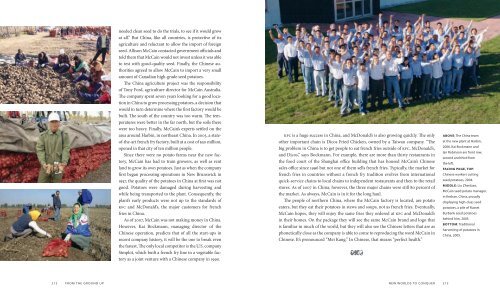From the Ground Up - McCain Foods Limited
From the Ground Up - McCain Foods Limited
From the Ground Up - McCain Foods Limited
Create successful ePaper yourself
Turn your PDF publications into a flip-book with our unique Google optimized e-Paper software.
needed clean seed to do <strong>the</strong> trials, to see if it would grow<br />
at all.” But China, like all countries, is protective of its<br />
agriculture and reluctant to allow <strong>the</strong> import of foreign<br />
seed. Allison <strong>McCain</strong> contacted government officials and<br />
told <strong>the</strong>m that <strong>McCain</strong> would not invest unless it was able<br />
to test with good-quality seed. Finally, <strong>the</strong> Chinese authorities<br />
agreed to allow <strong>McCain</strong> to import a very small<br />
amount of Canadian high-grade seed potatoes.<br />
The China agriculture project was <strong>the</strong> responsibility<br />
of Tony Ford, agriculture director for <strong>McCain</strong> Australia.<br />
The company spent seven years looking for a good location<br />
in China to grow processing potatoes, a decision that<br />
would in turn determine where <strong>the</strong> first factory would be<br />
built. The south of <strong>the</strong> country was too warm. The temperatures<br />
were better in <strong>the</strong> far north, but <strong>the</strong> soils <strong>the</strong>re<br />
were too heavy. Finally, <strong>McCain</strong>’s experts settled on <strong>the</strong><br />
area around Harbin, in nor<strong>the</strong>ast China. In 2005, a stateof-<strong>the</strong>-art<br />
french fry factory, built at a cost of $50 million,<br />
opened in that city of ten million people.<br />
Since <strong>the</strong>re were no potato farms near <strong>the</strong> new factory,<br />
<strong>McCain</strong> has had to train growers, as well as rent<br />
land to grow its own potatoes. Just as when <strong>the</strong> company<br />
first began processing operations in New Brunswick in<br />
1957, <strong>the</strong> quality of <strong>the</strong> potatoes in China at first was not<br />
good. Potatoes were damaged during harvesting and<br />
while being transported to <strong>the</strong> plant. Consequently, <strong>the</strong><br />
plant’s early products were not up to <strong>the</strong> standards of<br />
KFC and McDonald’s, <strong>the</strong> major customers for french<br />
fries in China.<br />
As of 2007, <strong>McCain</strong> was not making money in China.<br />
However, Kai Bockmann, managing director of <strong>the</strong><br />
Chinese operation, predicts that of all <strong>the</strong> start-ups in<br />
recent company history, it will be <strong>the</strong> one to break even<br />
<strong>the</strong> fastest. The only local competitor is <strong>the</strong> U.S. company<br />
Simplot, which built a french fry line in a vegetable factory<br />
as a joint venture with a Chinese company in 1990.<br />
KFC is a huge success in China, and McDonald’s is also growing quickly. The only<br />
o<strong>the</strong>r important chain is Dicos Fried Chicken, owned by a Taiwan company. “The<br />
big problem in China is to get people to eat french fries outside of KFC, McDonald’s,<br />
and Dicos,” says Bockmann. For example, <strong>the</strong>re are more than thirty restaurants in<br />
<strong>the</strong> food court of <strong>the</strong> Shanghai office building that has housed <strong>McCain</strong>’s Chinese<br />
sales office since 1996 but not one of <strong>the</strong>m sells french fries. Typically, <strong>the</strong> market for<br />
french fries in countries without a french fry tradition evolves from international<br />
quick-service chains to local chains to independent restaurants and <strong>the</strong>n to <strong>the</strong> retail<br />
stores. As of 2007 in China, however, <strong>the</strong> three major chains were still 80 percent of<br />
<strong>the</strong> market. As always, <strong>McCain</strong> is in it for <strong>the</strong> long haul.<br />
The people of nor<strong>the</strong>rn China, where <strong>the</strong> <strong>McCain</strong> factory is located, are potato<br />
eaters, but <strong>the</strong>y eat <strong>the</strong>ir potatoes in stews and soups, not as french fries. Eventually,<br />
<strong>McCain</strong> hopes, <strong>the</strong>y will enjoy <strong>the</strong> same fries <strong>the</strong>y ordered at KFC and McDonald’s<br />
in <strong>the</strong>ir homes. On <strong>the</strong> package <strong>the</strong>y will see <strong>the</strong> same <strong>McCain</strong> brand and logo that<br />
is familiar in much of <strong>the</strong> world, but <strong>the</strong>y will also see <strong>the</strong> Chinese letters that are as<br />
phonetically close as <strong>the</strong> company is able to come to reproducing <strong>the</strong> word <strong>McCain</strong> in<br />
Chinese. It’s pronounced “Mei Kang.” In Chinese, that means “perfect health.”<br />
212 <strong>From</strong> <strong>the</strong> GrouN d up<br />
New w orlds to CoN quer 213<br />
ABOvE: The China team<br />
at <strong>the</strong> new plant at Harbin,<br />
2006. Kai Bockmann and<br />
Ian Robinson are front row,<br />
second and third from<br />
<strong>the</strong> left.<br />
FACING PAGE, tOP:<br />
Chinese workers cutting<br />
seed potatoes, 2004.<br />
MIddlE: Liu Zhenbao,<br />
<strong>McCain</strong> seed potato manager,<br />
in Keshan, China, proudly<br />
displaying high-class seed<br />
potatoes, a pile of Russet<br />
Burbank seed potatoes<br />
behind him, 2005.<br />
BOttOM: Traditional<br />
harvesting of potatoes in<br />
China, 2005.






